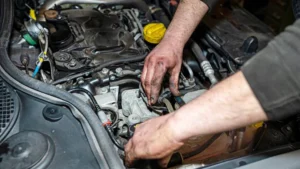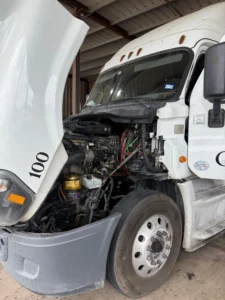
When you pull an axle or check your differential fluid, the last thing you want to see is milky differential fluid. That cloudy, coffee-colored appearance isn’t just “old oil” — it’s a red flag that water has contaminated your system. Left untreated, this can cause catastrophic damage to your gears, bearings, and axles.
At Sam’s Roadside Service, Towing & Recovery LLC, we’ve seen it all — from minor gear oil contamination to complete driveline failures caused by water intrusion. This blog will break down what milky differential oil means, what causes it, why it’s dangerous, and how you should address it immediately.
What Causes Milky Differential Fluid?
Milky gear oil forms when water mixes with your differential fluid. Gear oil is designed to provide heavy lubrication and withstand extreme pressure, but it’s not meant to mix with moisture. Even a small amount of water leads to foaming, discoloration, and reduced performance.
Here are the most common causes of differential fluid contamination:
Driving through deep water — Axle breathers allow pressure release, but if they’re not sealed properly, water seeps in.
Failed axle seals or hub seals — A worn hub or leaking seal lets in moisture over time.
Cracked axle housing — Any structural damage can provide a direct pathway for water intrusion.
Pressure washing or improper storage — High-pressure cleaning without precautions can push water into vent tubes.
👉 If you’ve recently driven through flood waters or noticed fluid leaks, it’s critical to check your diff fluid before serious damage occurs.
Why Milky Differential Fluid is a Serious Problem
Ignoring cloudy differential oil is like ignoring chest pains — it only gets worse. Here’s why water in your gear oil is so dangerous:
Loss of lubrication – The mixture of water and oil reduces the fluid’s ability to protect the ring and pinion.
Corrosion and rust – Bearings, gear teeth, and the housing itself begin to rust almost immediately.
Heat buildup – Lack of proper lubrication leads to excess heat and friction.
Premature driveline failure – Axles, bearings, and the differential itself may require full replacement.
Once milky gear oil is inside your system, the clock is ticking. Acting fast can mean the difference between a quick flush and a costly rebuild.
What To Do If You Find Milky Gear Oil
If you notice milky differential fluid while doing a check, don’t just top it off and keep driving. The fluid must be completely drained and the system inspected. Here’s the recommended process:
Drain the differential – Remove all contaminated fluid immediately.
Pull the axles – This allows for full inspection and cleaning.
Flush the housing – Ensure no contaminated oil or water remains.
Inspect bearings and gear teeth – Look for pitting, rust, or scoring.
Refill with OEM-spec gear oil – Always replace with the correct grade of differential fluid.
Check vent tubes and seals – Find and fix the root cause of water intrusion.
This process can often be done roadside or in a shop. At Sam’s Services, we specialize in emergency truck repair and can perform a full fluid inspection on the spot.
Roadside Support You Can Count On
No matter the situation, our reliable roadside assistance ensures you get the help you need, fast. From breakdowns to emergencies, we’re here 24/7 to keep you moving.
How to Prevent Water in Differential Fluid
The best way to deal with milky diff fluid is to prevent it from happening in the first place. Here are some tips:
Keep axle breathers sealed and functional.
Replace hub seals and axle seals at the first sign of leakage.
Avoid pressure washing near vent tubes.
Regularly schedule Trailer Repair & Suspension Service to catch leaks early.
During routine maintenance, ask for a fluid check to spot issues before they escalate.
Routine checks are part of keeping your fleet safe. At Sam’s Services, we don’t just top off fluids — we inspect them thoroughly.
Why Choose Sam’s Services for Differential Repairs?
When you’re on the road and notice something wrong — whether it’s milky differential fluid, a hub oil issue, or even clutch replacement needs — you need a trusted team to get you rolling again.
Here’s why drivers across Houston rely on us:
24/7 Roadside Assistance — Day or night, we’re ready to respond.
Heavy-Duty Expertise — From tractor-trailer roadside repair to semi-truck towing, we handle it all.
Preventive Care — We don’t just fix; we prevent future breakdowns with thorough inspections.
Trusted by Commercial Fleets — Our reputation for reliability makes us Houston’s go-to for emergency truck repair.
When your truck is your livelihood, trust Sam’s Roadside Service Towing and Recovery LLC to keep it protected.
Conclusion
Finding milky differential fluid is never a good sign, but catching it early can save you from expensive repairs. Water in your differential leads to corrosion, heat, and driveline failure if ignored.
The good news? With quick action and expert help from Sam’s Services, you can flush the system, fix the root cause, and keep your truck running safely.
Don’t wait until a contaminated diff leaves you stranded — contact our 24/7 roadside team today.
FAQs About Milky Differential Fluid
Milky differential fluid is caused by water mixing with gear oil. Common sources include bad axle seals, failed hub seals, cracked housings, or driving through deep water with unsealed breathers.
No. Driving with contaminated fluid can lead to gear failure, bearing damage, and costly driveline repairs. Immediate inspection and flushing are required.
The differential must be drained, flushed, inspected, and refilled with OEM-spec oil. The source of water intrusion must also be repaired to prevent recurrence.
Yes. If ignored, water contamination can corrode bearings, damage gears, and cause full axle or differential failure.
Routine checks, proper sealing of axle breathers, and early replacement of hub seals can prevent milky gear oil. Regular inspections at Sam’s Services can catch issues early.



